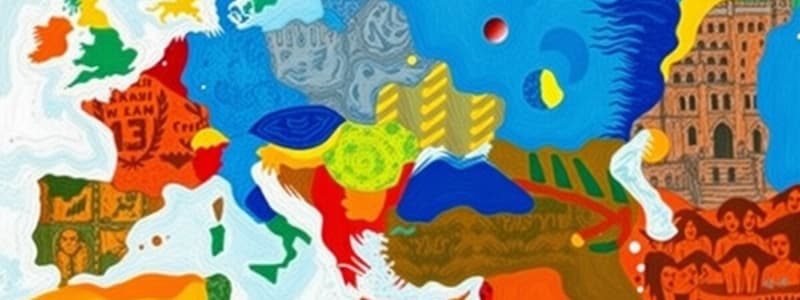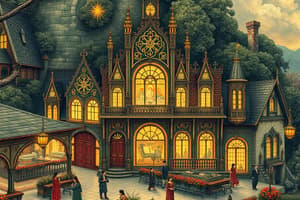Podcast
Questions and Answers
What is the primary purpose of government?
What is the primary purpose of government?
- To maintain cultural practices
- To enforce laws and maintain order (correct)
- To provide social services
- To regulate the economy
Which of the following best describes ethnocentrism?
Which of the following best describes ethnocentrism?
- The belief in the superiority of one’s own culture (correct)
- The practice of studying ancient archaeology
- The acceptance of all cultural practices as equal
- A system of trade based on bartering
What characterized the Neolithic Age as a revolution?
What characterized the Neolithic Age as a revolution?
- The invention of writing systems
- The development of agriculture and permanent settlements (correct)
- The widespread use of metal tools
- The start of hunter-gatherer societies
Why did civilizations commonly emerge in river valleys?
Why did civilizations commonly emerge in river valleys?
What was a significant achievement of ancient Greece?
What was a significant achievement of ancient Greece?
How did monsoons impact the lives of Indians?
How did monsoons impact the lives of Indians?
Which statement about the Pax Romana is correct?
Which statement about the Pax Romana is correct?
Which of the following best defines polytheism?
Which of the following best defines polytheism?
Flashcards
Democracy
Democracy
A system of government where citizens have the power to make decisions, often through voting.
Archeology
Archeology
The study of past societies by examining their material remains, such as artifacts, buildings, and tools.
Neolithic Revolution
Neolithic Revolution
The period in human history marked by the development of agriculture, allowing people to settle in one place and grow crops.
Polytheism
Polytheism
Signup and view all the flashcards
Monotheism
Monotheism
Signup and view all the flashcards
Hammurabi's Code
Hammurabi's Code
Signup and view all the flashcards
Ethnocentrism
Ethnocentrism
Signup and view all the flashcards
Cultural Diffusion
Cultural Diffusion
Signup and view all the flashcards
Study Notes
Introductory Terms of Geography & Culture
- Geography affects culture
- Cultural diffusion and diversity are examples
- Ethnocentrism is defined and examples given
- Government's purpose and democracy are discussed
- Command, traditional, and market economies are compared
Pre-History
- Archaeology's role in determining human origins
- Paleolithic Age characteristics
- Neolithic Revolution as a turning point
- Paleolithic and Neolithic Ages are contrasted
Rise of Civilizations
- River valleys' role in civilization development
- Common features of river valleys (Nile, Tigris-Euphrates, Yellow, Indus Rivers)
- Hammurabi's Code and its impact
Classical Civilizations
- Geography's influence on Greek and Roman development
- Athens and Sparta are compared
- Greek achievements and democracy's development
- Roman law (12 Tables) and borrowed Greek ideas
- Pax Romana as a golden age
- Fall of the Roman Empire
- Gupta Empire's golden age and Indian monsoons
- Abbasid Dynasty's golden age
- Dynastic Cycle in China and the Great Wall's impact
Religious and Belief Systems
- Polytheism's meaning and examples
- Monotheistic religions' development
- Judaism, Christianity, and Islam's similarities and differences
- Hinduism and Buddhism's development in India
- Comparison of Hinduism and Buddhism
- Caste System, Karma, Dharma, Reincarnation
- Three Schools of Thought in China (Confucianism, Daoism, Legalism)
- Comparison and Contrast
Byzantine Empire
- Constantinople as "New Rome"
- Justinian's Golden Age
- Eastern Orthodox Christianity and Roman Catholicism compared
Middle Ages
- The Fall of Rome
- Western European Dark Ages
- Feudalism and Manorialism
Studying That Suits You
Use AI to generate personalized quizzes and flashcards to suit your learning preferences.




